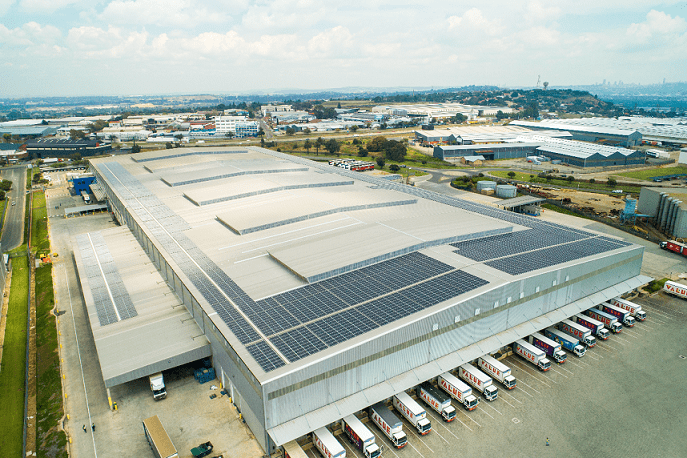 Ekurhuleni Municipality has approved the connection of a large solar PV plant and battery system, marking a landmark moment in renewable energy projects in South Africa.
Ekurhuleni Municipality has approved the connection of a large solar PV plant and battery system, marking a landmark moment in renewable energy projects in South Africa.
The PV and lithium-ion battery system will form one of South Africa’s largest microgrids: a 1.8 MW solar PV facility alongside a 2.9 MWh battery, whilst being grid-connected in order to stabilise the local grid.
PepsiCo Sub-Saharan Africa (SSA), who procured the system from the SOLA Group, aims to secure energy supply and reduce carbon emissions at its large distribution centre, near Kempton Park in Johannesburg.
“We are pleased to have implemented such a landmark project at one of our South African facilities,” said Umesh Himraj, Engineering Sustainability Lead at PepsiCo SSA.
“This approach and investment into renewable energy forms part of our PepsiCo positive journey – a strategic end-to-end transformation with sustainability at the centre of how the company will create growth and value”, he added.
The microgrid solution was engineered and constructed by the SOLA Group.
“The solution that we devised uses the roof space at PepsiCo’s facility to house solar modules which generate enough solar electricity during the day to run the plant entirely, and store excess power in the battery. The solution provides near 100% renewable energy for this facility,” said Dom Wills, CEO of the SOLA Group.
Historically, microgrids have been an appealing but expensive option for businesses, but the substantial cost reductions in renewable energy technology, alongside grid unreliability and rising electricity tariffs, are now making them much more feasible for large energy consumers.
In 2021, South Africa experienced over 1130 combined hours of load shedding, making it a large enough risk for businesses such as PepsiCo to seek out alternatives.
“We didn’t expect it to be financially viable for large energy consumers to completely defect from the grid for another two years. However, after years of compounded electricity price increases, this investment is turning out to be lucrative for large energy consumers, providing cheaper power and immunity from load shedding. In addition, many companies have sustainability targets and are looking to make their operations more environmentally-friendly,” adds Wills.
Despite the ability of the plant to be completely off-grid, the renewable energy system has also received the requisite municipal and NERSA approvals to connect to the grid, which will allow PepsiCo SSA to sell excess energy back to the municipality.
Large-scale energy storage solutions are imperative for high renewable energy penetration as they enable the consistent supply of power and combat intermittency.
SOLA has completed a number of microgrids in Southern Africa, the most notable being the microgrid on Robben Island.
